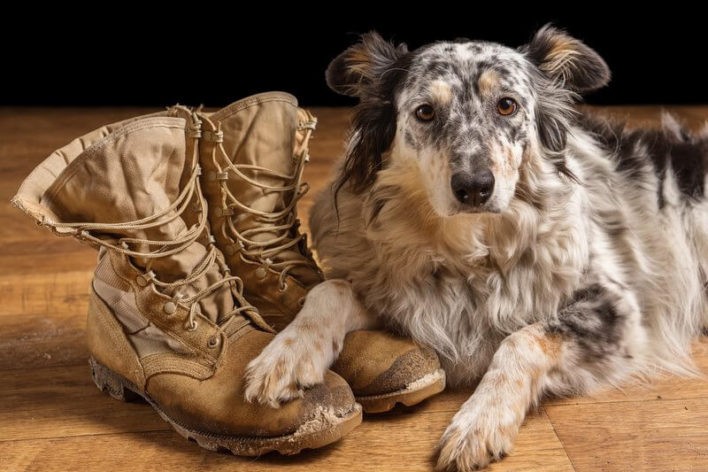Man’s Best Friend Versus PTSD

In 2023, the Pew Research Center published a statistic, noting there are approximately 18 million veterans in the United States. A significant number of those veterans have faced challenges integrating back into civilian life after military service.
There are estimates that as many as 20 percent of all U.S. veterans suffer from post-traumatic stress disorder, or PTSD, which is one of the most common trauma-induced mental illnesses afflicting veterans today.
There are also studies suggesting that as many as 20 veterans commit suicide every day. The VA maintains the largest national database tracking veteran suicide in the nation, and it reported that there was an average of 17 veteran suicides every day in 2017. That trend has been ticking up since then.
The federal government has a variety of programs to help military members and families deal with issues like PTSD. Still, there are community resources and other options to find support for those veterans who suffer from PTSD.
Let’s Take the Dogs Out
In a study by Dr. Cheryl Krause-Parello, researchers found that walking with a dog from local shelters had a greater effect on psychological and physiological stress indicators in veterans than walking with another human.
“Our study provides evidence that walking with a shelter dog may benefit veterans with higher symptoms of post-traumatic stress. Severity of symptoms and perceived stress tended to decrease more after walks with a dog than walks with a human,” said Dr. Krause-Parello.
“Our findings emphasize the need for more research,” she continues, “to determine if this form of human-animal interaction is beneficial to veterans with PTSD and to help us identify the optimal level of interaction that will be most impactful for them.”
Their study focused on using dogs from local shelters who need to be walked to decrease their own stress of being in a kennel for long periods of time.
By using these shelter dogs, researchers were able to randomize the interactions between veterans suffering from PTSD and the 72 different dogs that participated in the study.
Their findings indicate that, regardless of the dog’s size, the walks were beneficial to all participating veterans with varying degrees of PTSD.
Opportunities for Veterans
There are many organizations who offer to help veterans get matched with or train with dogs. They include:
If you’re just looking to walk a dog a few times a week, check with your local shelter. If you need help finding your local shelter, try Petfinder, which connects you with nearby shelters.
You can also look for agencies that offer veteran support services. Check out your local shelter to discover what veteran programs they have.
(Image courtesy of Lindsay Helms via 123rf.com)
RELATED:
- Dog & Pet Military Discounts and Services
- PTSD Awareness Day
- Where To Find Service Dogs For Veterans and Military
- Mental Health & Resilience Resources For Veterans
- K9 Veterans Day: Military Working Dog History
- Guitars For Veterans (G4V)
- The Veteran’s Ranch: Helping Our Homeless Heroes


